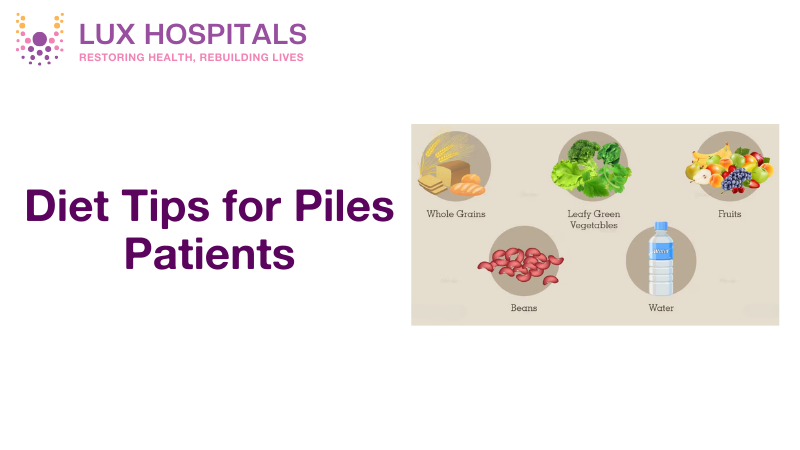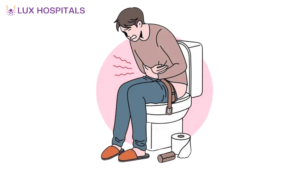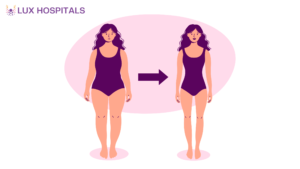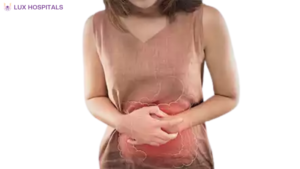Diet Tips for Piles Patients: A Complete Guide

Piles, or hemorrhoids, are inflamed veins in the rectum and anus that can cause pain, discomfort, and bleeding. A balanced diet is an important factor in curing piles, alleviating symptoms, and preventing recurrence. This guide provides comprehensive diet tips for patients, including foods to eat, foods to avoid, and frequently asked questions to help you maintain a healthy lifestyle.
What is Piles?
Piles are inflamed and swollen veins around the anus or in the lower rectum. Common symptoms include pain, itching, bleeding during bowel movements, and swelling around the anus. Swollen veins in the rectum or anus that cause pain, itching, and bleeding are called piles, sometimes referred to as hemorrhoids. This common ailment can be brought on by extended sitting, pregnancy, or chronic constipation. To properly manage piles, prompt treatment with medication, lifestyle modifications, or medical treatments is necessary.
Importance of Diet in Piles Treatment
For people with piles, a nutritious and proper diet helps soften stool, which eases passage and lessens strain during bowel movements. This encourages quicker healing and lessens hemorrhoid inflammation.
Best Foods for Piles Patients
1. Fiber-Rich Foods
Including fiber in diet tips for piles patients is crucial for digestion and preventing constipation, a major cause of piles. It helps bulk up stools and makes them softer, which reduces the need for straining during bowel movements.
- Whole Grains: Brown rice, oats, quinoa, and whole wheat bread
- Legumes: Lentils, chickpeas, and beans
- Fruits: Apples, pears, oranges, and bananas
- Vegetables: Broccoli, carrots, spinach, and kale
- Nuts and Seeds: Almonds, chia seeds, and flaxseeds
2. Hydrating Foods
Proper hydration is key to prevent constipation. Water-rich foods can help keep stools soft and easy to pass.
- Cucumbers
- Watermelon
- Oranges
- Celery
- Tomatoes
3. Probiotic Foods
Probiotic foods improve gut health by increasing the number of good bacteria in the digestive system. These foods help promote regular bowel movements, prevent constipation, and enhance overall digestive health.
- Yogurt
- Kimchi
- Sauerkraut
- Kefir
4. Anti-Inflammatory Foods
Anti-inflammatory foods help reduce swelling and pain associated with piles. Including these foods in your diet can boost immunity and improve overall gut health. Regular consumption of these foods can alleviate pain and promote faster healing.
- Turmeric
- Ginger
- Green Tea
- Olive Oil
Foods to Avoid
Certain foods can worsen piles symptoms and should be avoided. When suffering from piles, it’s important to avoid certain foods that can worsen symptoms like constipation, irritation, and pain. Here are some foods to avoid:
- Spicy Foods Can irritate the digestive tract
- Processed Foods: Low in fiber and high in unhealthy fats
- Alcohol: Dehydrates the body, leading to constipation
- Caffeinated Drinks Can cause dehydration
- Red Meat: Difficult to digest and can lead to constipation
Meal Plan for Piles Patients
Breakfast
- Oatmeal with flax seeds and fresh fruit
- Herbal tea or warm water with lemon
Lunch
- Brown rice with lentil curry and a side salad
- Yogurt with cucumber
Evening Snack
- Handful of almonds and a fruit salad
Dinner
- Grilled fish with quinoa and steamed vegetables
- Green tea
Lifestyle Tips Along with Diet
Managing piles not only requires a proper diet but also a healthy lifestyle. Adopting positive habits and avoiding certain foods can significantly ease symptoms and prevent recurrence.
- Drink at least 8-10 glasses of water daily
- Exercise regularly to improve bowel movements
- Avoid sitting for long periods
- Practice good bathroom habits, such as not straining during bowel movements
- Engage in regular physical activities like walking, swimming, or light yoga to improve digestion and blood circulation.
- Practice pelvic floor exercises (Kegels) to strengthen muscles around the anus and prevent strain.
- Avoid prolonged sitting or standing for long hours – take small breaks in between.
Healthy Habits
- Delaying bowel motions can result in firm stools; therefore, avoid doing so.
- When sitting for extended periods of time, use a soft cushion.
- After having a bowel movement, wash your anal area with warm water to maintain good cleanliness.
- Stay clear of using toilet paper too much, as this can irritate your skin.
Conclusion
To manage and prevent piles from recurring, a balanced diet is required. Proper hydration, fiber consumption, and the avoid of irritants like spicy foods can also contribute to your improvement. These food suggestions can help to promote recovery and preserve digestive health.
Frequently Asked Questions
A high-fiber diet rich in fruits, vegetables, whole grains, and plenty of water helps soften stools and prevent constipation, reducing strain on piles.
Avoid spicy foods, processed foods, red meat, alcohol, and low-fibre foods, as they can worsen constipation and irritation.
Fibre-rich foods like leafy greens, lentils, flaxseeds, and fruits (like bananas and apples) promote smooth bowel movements and reduce the risk of piles.
A fibre-rich diet softens stools, prevents straining during bowel movements, and reduces inflammation, helping prevent and manage piles.
Spicy foods can worsen piles symptoms by irritating the digestive tract. It is best to avoid them.
Coffee can cause dehydration, which may worsen constipation and piles symptoms. It is advisable to limit coffee intake.
Aim to drink 8-10 glasses of water daily to keep your stools soft and prevent constipation.
Yes, bananas are fibre-rich and can help regulate bowel movements, making them an excellent choice for patients with piles.
Eggs are low in fiber and should be consumed in moderation. Pair them with fibre-rich foods like whole grains and vegetables.





















